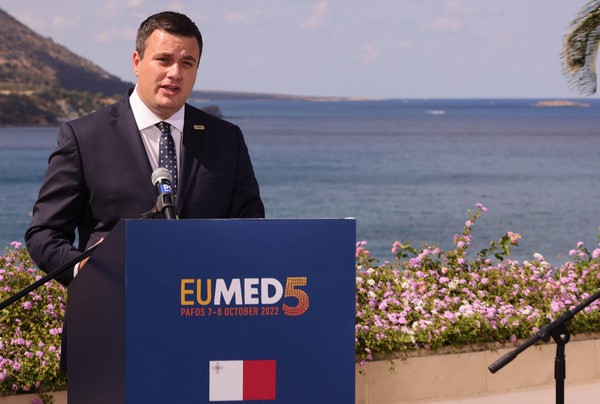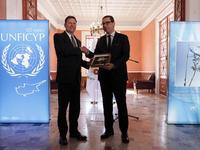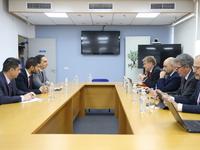Press Releases

08-10-2022 17:41
Statement by the Minister for Home Affairs of Malta, Mr Byron Camilleri, during the press conference of the MED5 Summit
I wish to thank my friend Nicos for the friendly and welcoming reception here in Pafos.
Historically, there have always been great similarities between Malta and Cyprus, and I believe that the situation is still the same on several matters.
We meet once again here to discuss solutions. Solutions which are crucial and important for both of us as the two smallest Member States in the EU, which happen to be small island states in the Mediterranean.
This meeting is taking place eight months after a war broke out in Europe after so many years. A war which is still going on, and its impacts still being felt by every Member State of the European Union.
It is also taking place four months after a vast majority of Ministers of the interior of the EU Member States' have agreed on a declaration providing a temporary solidarity mechanism.
A mechanism which is meant to alleviate the migratory pressure that us, the five Mediterranean countries face throughout the whole year, and which gives priority to the relocation of migrants to other Member States.
In these four months we have seen extensive consultation with the MED5 countries on solidarity, as well as the first transfer of migrants from Italy to other countries. We are thankful to the European Commission for their effort to get things going in such a short period of time.
Admittedly, the process is still in its initial phase. Nevertheless, there are several indicators which cannot be ignored and which merit serious discussions. Observations which will undoubtedly condition our position on the remaining parts of the discussions on the Pact on Migration and Asylum.
Whilst thanking the member states who have made pledges for relocation, Malta remains concerned that the number of pledges for relocation made by participating Member States is a far cry, a very small fraction, from the actual number of irregular arrivals that Malta, Cyprus, Italy, Spain, and Greece have received in the first nine months of this year.
Secondly, we believe that those Member States which have been experiencing the highest number of arrivals should be given priority; they should be the first to benefit from relocation, and the most in terms of the number of migrants relocated.
On the other hand, we cannot accept a situation whereby a frontline Member State would be punished for striving to prevent irregular flows, fight people smuggling and reduce illegal entries. It is very important that solidarity, most importantly relocation, would apply to all Mediterranean countries – in a way that interventions could be deemed to be making a difference on the ground.
Solidarity is crucial. Yet, it is has become obvious more than ever, that solidarity must only complement – not replace – the extensive work that we need to do on the external dimension. Mainly the prevention of irregular entries, the fight against the smuggling of human beings and the return or rejected asylum seekers.
The impact of the war and the increasing prices of basic commodities have resulted in a new wave of economic migration. Individuals risking their lives to reach Europe, purely for economic purposes. Sub-Saharan migrants who originally seek employment in Libya and turns to smugglers when things do not work out as planned.
People are dying around us, a tragedy after another, from Lebanon to the Atlantic. Vigils are held every time there are people dead, missing or unaccounted for.
We have lost so much time making statements and engage in endless finger pointing. Meanwhile, children and adults continue to lose their lives while we ignore the elephant in the room.
How long is its going to take us – Europeans – to admit that the only way to save lives is to eradicate people smuggling once and for all?
How long is it going to take us – governments of European countries and EU institutions – to understand that if we do not want people to die, we should not allow these dangerous journeys to happen?
How long is it going to take us to admit that we cannot address this issue without urgent and extraordinary measures to support neighboring transit countries in North Africa and the Middle East?
We wish to see the European Union acting faster on the external dimension mostly through successful return operation coupled with the provision of support to countries of origin to create opportunities for their own people – particularly young people who are so eager to train and work like most of migrants reaching our shores.
We should be acting faster on supporting the efforts of transit countries to fight criminal smuggling networks and reduce the number of persons who risk their lives at sea. There are solutions – and I wish to reiterate once again the importance of drafting and implementing these solutions together with these transit countries.
Millions of Europeans are frustrated by the lack of results on migration. They cannot have trust in a migration system where asylum laws may be exploited so easily. The people want to see those who are not eligible for protection returned to their countries of origin, not rewarded for entering our countries illegally. They do not accept the notion that smugglers decide who should make it to Europe, if they do not lose their lives in the process.
We all know the outcome of the status quo. It is our obligation to make things different than how they have developed so far.
(NG/SCH)
Relevant Press Releases


19-04-2024 16:42
PIO e-mail Αlerts service is suspended

11-03-2024 08:41
Elections 2024 – European and Local Government Elections 2024




